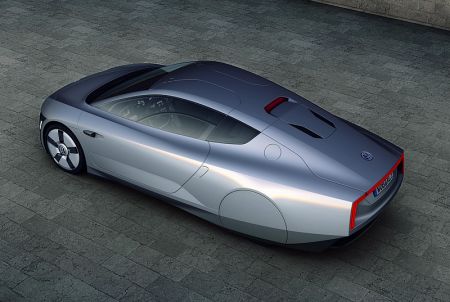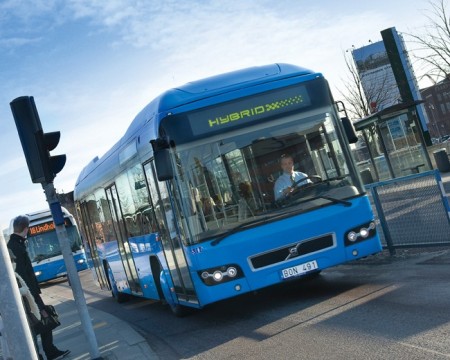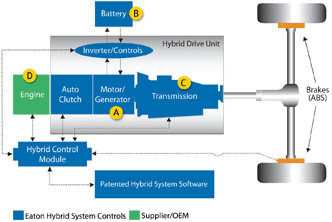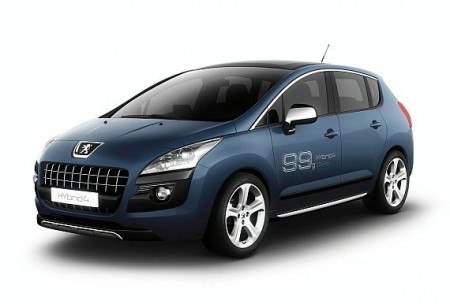Feb
10
Can Diesel Hybrid Be the Transition to Full Electric Drive?
February 10, 2011 | 3 Comments
Volkswagen first showed its XL1 diesel plug-in hybrid electric vehicle prototype during the last week of January. The prototype, representing the third evolutionary stage of Volkswagen’s 1-liter car strategy features, according to VW, combined fuel consumption of 0.9 L/100 km (261 mpg US). The plug-in hybrid system consists of a 0.8L two-cylinder TDI engine (35 kW / 47 hp), E-motor (20 kW / 27 hp), 7-speed dual-clutch transmission (DSG) and lithium-ion battery. The XL1 prototype has an all-electric range of up to 35 kilometers (22 miles); total range is approx. 550 km (342 miles) with a 10-liter fuel tank, not quite 2.2 U.S. gallons. It’s really small and really light.
Hybrid trucks are already in commercial production with the industry set for considerable growth. Although the U.S. lags behind Europe in terms of favoring light-duty diesel applications, interest may soon grow as the European market takes off.
The efficiency benefits of diesel hybrid technologies are impressive, providing an average fuel consumption saving of 20 to 35 percent. When biodiesel is added to the fuel mix, the environmental benefits are added too, especially when it comes to carbon dioxide emissions.
Hybrid buses, highly like medium duty trucks are coming on strongly as well. Volvo Bus Corp. also has several different hybrid technologies in production today, including those designed for both the European and North American markets. The company has been working at developing its diesel hybrid technology since 2002 and began vehicle production in 2006. “We started the industrial-scale production in May 2010,” says Edward Jobson, Volvo Bus environmental director, noting that before reaching industrial production, his company did on-demand building.
Diesel hybrid technology has been commercially available in heavy-duty trucks for several years. In the U.S. Eaton Vehicle Group has been working to develop electric hybrid systems for two decades and has been producing them commercially since 2007. The company also began offering a hydraulic hybrid system in 2010.
Eaton provides its technology to major truck and bus manufacturers around the world. The company offers several hybrid technologies, all of which are fuel neutral and can be added to diesel powertrains, says James Parks, Eaton’s manager of global communications-hybrid. Eaton’s hybrid electric technology maintains the conventional drivetrain architecture and is designed to recover power typically lost during braking, and stores it in batteries. The company also offers two hybrid hydraulic systems: one that offers regeneration and launch assist, and another that completely replaces the conventional drivetrain.
Volvo’s diesel hybrid buses are able to achieve a 30 to 35 percent reduction in fuel consumption in city driving use, and a 20 to 30 percent reduction when highway driving. The Volvo 7700 Hybrid model uses parallel hybrid technology. That means that the diesel engine and electric motor can work either independently or in unison to power the bus. The electric motor is used to start the vehicle moving and can power acceleration up to approximately 20 kilometers per hour (12.5 mph). As the speed increases the diesel engine takes over, supplying the power. Batteries are used to power the electric engine are recharged by both the brakes and the diesel engine.
Volvo also supplies gas-powered buses to the market. But since the May 2010 launch of its 7700 Hybrid diesel model, Volvo’s Jobson notes that his company has sold more hybrid diesel buses than gas buses. In fact, Volvo has received orders for nearly 200 hybrid buses in its first six months of production. In mid-December, the company secured its largest single order to date when bus operator Arriva ordered 27 Volvo 7700 Hybrid buses, which will be used in Dordrecht, Netherlands.
The European market is proportionally much more diesel over gas engines – at least half of the passenger cars on European roads are equipped with diesel engines. It’s becoming clear that diesel hybrids are also significantly more efficient and less expensive than their gas-electric hybrid counterparts.
Volvo’s truck experience illuminates the car market potential for Europe. Volvo’s Jobson said, “Customers are very happy with the hybrid, with the performance, the reliability and the fuel consumption, of course. Also dare I say – the pricing.” Jobson says that most customers understand that they can save money over the lifetime of the vehicle. Many also see it as a sort of insurance to protect them from rising oil prices. Strong demand also means that Volvo will be offering more hybrid options to its customers in the future.
In contrast to America and as a dig to VW, Peugeot will launch at mid 2011 the world’s first production-scale diesel-electric hybrid passenger car. The 3008 HYbrid4 features an average fuel consumption savings of 35 percent. A traditional two-liter, 163-horsepower diesel engine mounted in the front of the vehicle, and a 37-horsepower electric engine mounted in the rear, provides the car with a maximum power output of 200 horsepower.
Eaton’s hybrid systems are all designed to be fuel-neutral, and are compatible with biodiesel. “It really doesn’t matter what fuel runs through the truck with our system,” Eaton’s Parks says. “We really don’t touch the fuel.”
Volvo’s activities with biofuel are particularly noteworthy. The company is currently field-testing its hybrid buses with full B100, 100% biodiesel. “The evaluation is not finished yet, but the expectation is that we will find that B100 is okay from a technical standpoint, but that you will need to take some service measures,” Jobson says. When it comes to biodiesel, Volvo is only testing B100 in its diesel hybrid bus systems, no blends included. “Either you have it or you don’t,” Jobson says. “If you allow biodiesel, you should be able to run them on up to 100 percent.” That research should include any extreme biodiesel production types such as algae.
The Volvo research isn’t complete, and is due to finish this year. Jobson says some of the anticipated service measures that are expected to be required for biodiesel use include increased intervals for oil and fuel filter changes. “You will also have to change – before you start with the B100, some seals and the fuel lines.” Specifically, fuel lines made of an alloy that contains copper must be replaced with stainless steel.
For Europe where fuel taxes make up a huge share of the price and increase the price dramatically fuel efficiency demand is more pronounced. Yet that 30% mileage gain, with the already 15+ percent of diesel’s better density, gat in city use cover nearly or better than 50% overall improvement in fuel costs. Even without massive tax, that’s something worth considering.
While we wait for the big improvement in storing electrical power the bio diesel industry should get a major boost with hybrid technology. Economic growth uses lots of diesel, and getting it to go further by more than 25% is well worth the investigation by car, truck and bus buyers.
Comments
3 Comments so far






good step in the right direction. Now introduce GreenNH3 non carbon fuel to replace the diesel and it would be a non carbon machine. Scientific American says peak 2014. Maybe diesel will not be available or $20 a gallon. What fuel are you going to use? Money needs to get behind some of this technology..
[…] This post was mentioned on Twitter by Ruben Me, Martell Thornton. Martell Thornton said: Can Diesel Hybrid Be the Transition to Full Electric Drive? | New …: Volvo's Jobson said, “Customers are very … http://bit.ly/eBAjt0 […]
[…] 61341 Marseilles, USA On this subject see: https://newenergyandfuel.com/http:/newenergyandfuel/com/2011/02/10/can-diesel-hybrid-be-the-transitio… […]